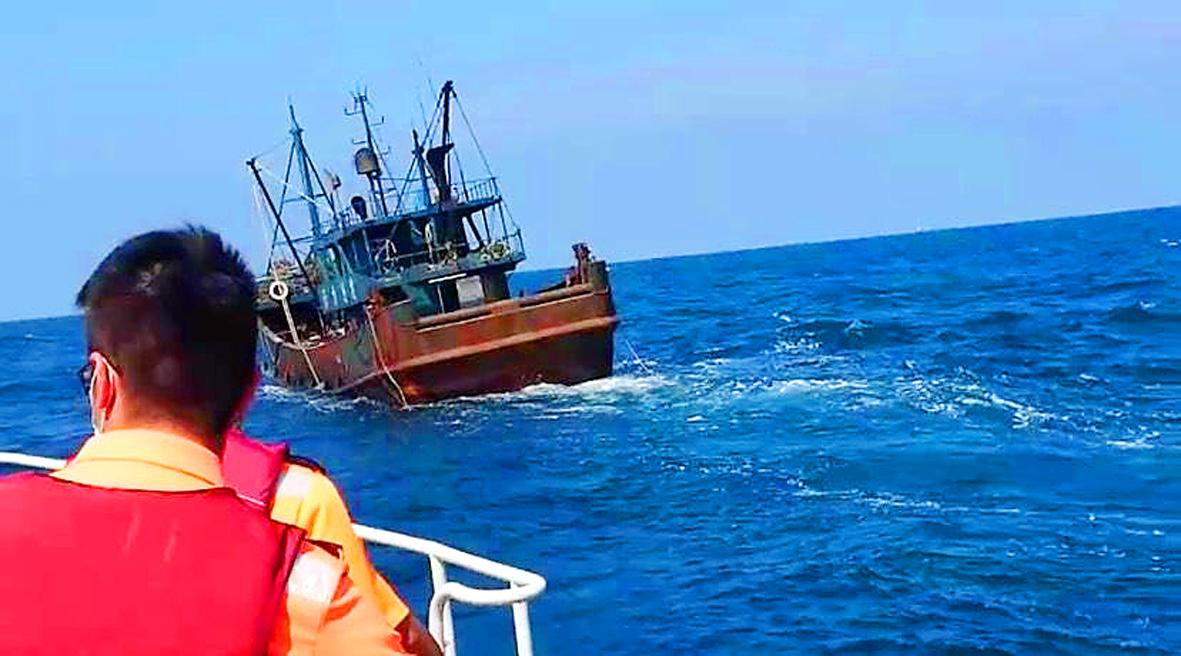Lawmakers across party lines proposed to allocate a portion of the fines imposed on Chinese vessels found trespassing in Taiwanese waters to the Coast Guard Administration (CGA), as part of efforts to boost the morale of officials at the agency.
Amid increasing incidents of Chinese vessels fishing and mining sand in the nation’s territorial waters, the lawmakers proposed amending the Act Governing Relations Between the People of the Taiwan Area and the Mainland Area (兩岸人民關係條例) and redirect such funds to the CGA to cover operational costs and performance bonuses.
The proposal was made by Democratic Progressive Party (DPP) legislators Yang Yao (楊曜) and Liu Chien-kuo (劉建國), Chinese Nationalist Party (KMT) legislators Chen Hsuen-sheng (陳雪生) and Chen Yu-jen (陳玉珍), and Independent Legislator Chao Cheng-yu (趙正宇).

Photo courtesy of the Coast Guard Administration’s Penghu Branch
The number of vessels intercepted by the CGA over the past three years totaled 3,803, including 290 ships seized and 81 confiscated, the lawmakers said.
A total of 194 ships were fined during the period, with fines totaling NT$193.2 million (US$6.69 million at the current rate), it added.
All of the funds were directed to the public treasury per the Act Governing the Allocation of Government Revenues and Expenditures (財政收支劃分法), the proposal said, adding that the CGA should also profit.
The budget allocated to the agency to patrol the nation’s territorial waters was NT$5.52 million from 2018 to last year, while the agency spent NT$5.86 million, the proposal said.
Article 80 of the allocation act should be amended to redirect part of the fines to agency, to partly cover the costs of its patrol missions, the proposal said.
The coast guard’s tasks are energy-consuming and dangerous, as it often has to deal with strong opposition from the crew on board the vessels found trespassing, the lawmakers said, adding that the amendment would also improve the agency’s human-resources situation.

Taiwan has received more than US$70 million in royalties as of the end of last year from developing the F-16V jet as countries worldwide purchase or upgrade to this popular model, government and military officials said on Saturday. Taiwan funded the development of the F-16V jet and ended up the sole investor as other countries withdrew from the program. Now the F-16V is increasingly popular and countries must pay Taiwan a percentage in royalties when they purchase new F-16V aircraft or upgrade older F-16 models. The next five years are expected to be the peak for these royalties, with Taiwan potentially earning

POSITIVE DEVELOPMENT: Japan and the US are expected to hold in-depth discussions on Taiwan-related issues during the meeting next month, Japanese sources said The holding of a Japan-US leaders’ meeting ahead of US President Donald Trump’s visit to China is positive news for Taiwan, former Japan-Taiwan Exchange Association representative Hiroyasu Izumi said yesterday. After the Liberal Democratic Party’s landslide victory in Japan’s House of Representatives election, Japanese Prime Minister Sanae Takaichi is scheduled to visit the US next month, where she is to meet with Trump ahead of the US president’s planned visit to China from March 31 to April 2 for a meeting with Chinese President Xi Jinping (習近平). Japan and the US are expected to hold in-depth discussions on Taiwan-related issues during the

‘LIKE-MINDED PARTNER’: Tako van Popta said it would be inappropriate to delay signing the deal with Taiwan because of China, adding he would promote the issue Canadian senators have stressed Taiwan’s importance for international trade and expressed enthusiasm for ensuring the Taiwan-Canada trade cooperation framework agreement is implemented this year. Representative to Canada Harry Tseng (曾厚仁) in an interview with the Central News Agency (CNA) said he was increasingly uneasy about Ottawa’s delays in signing the agreement, especially as Ottawa has warmed toward Beijing. There are “no negotiations left. Not only [is it] initialed, we have three versions of the text ready: English, French and Mandarin,” Tseng said. “That tells you how close we are to the final signature.” Tseng said that he hoped Canadian Prime Minister Mark Carney

STAY IN YOUR LANE: As the US and Israel attack Iran, the ministry has warned China not to overstep by including Taiwanese citizens in its evacuation orders The Ministry of Foreign Affairs (MOFA) yesterday rebuked a statement by China’s embassy in Israel that it would evacuate Taiwanese holders of Chinese travel documents from Israel amid the latter’s escalating conflict with Iran. Tensions have risen across the Middle East in the wake of US and Israeli airstrikes on Iran beginning Saturday. China subsequently issued an evacuation notice for its citizens. In a news release, the Chinese embassy in Israel said holders of “Taiwan compatriot permits (台胞證)” issued to Taiwanese nationals by Chinese authorities for travel to China — could register for evacuation to Egypt. In Taipei, the ministry yesterday said Taiwan